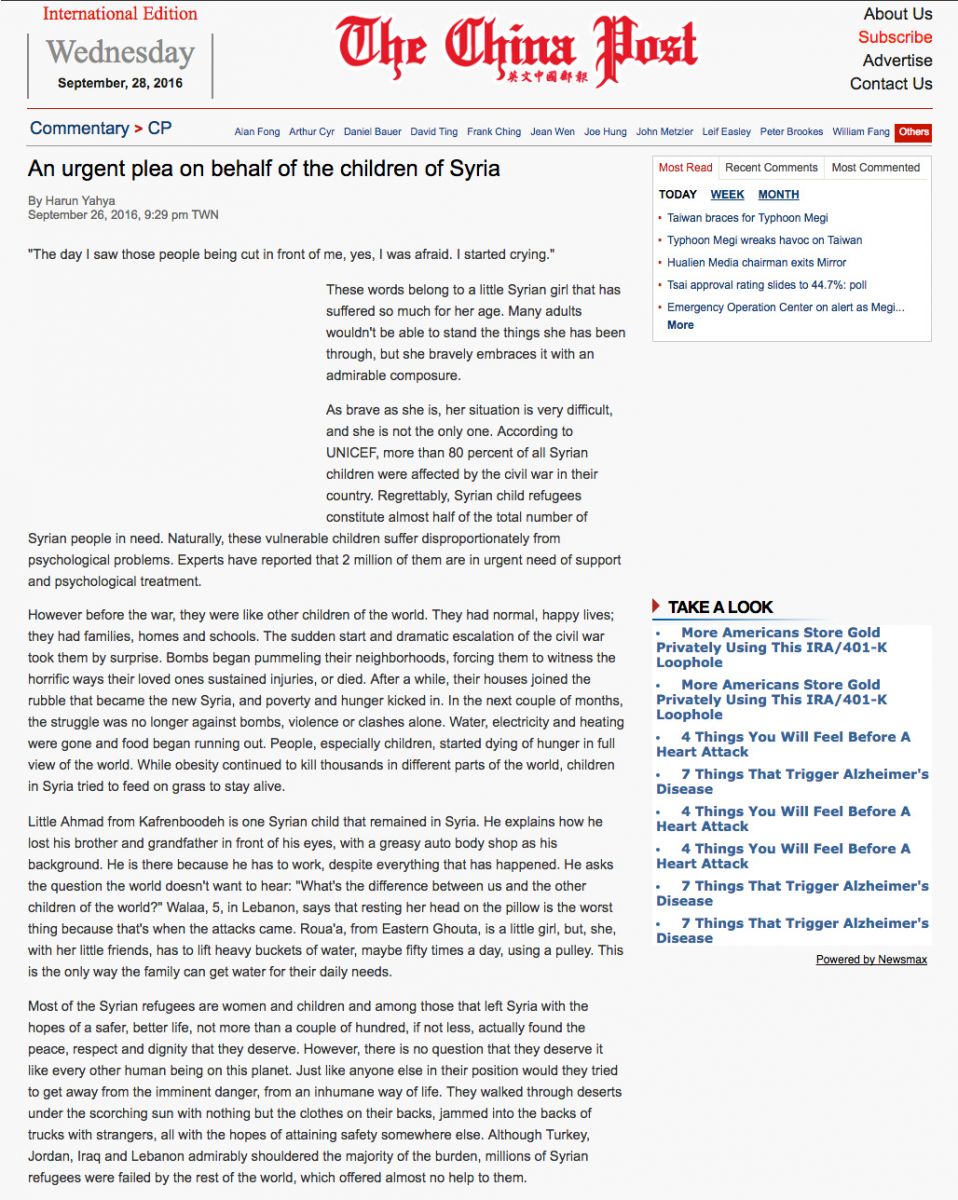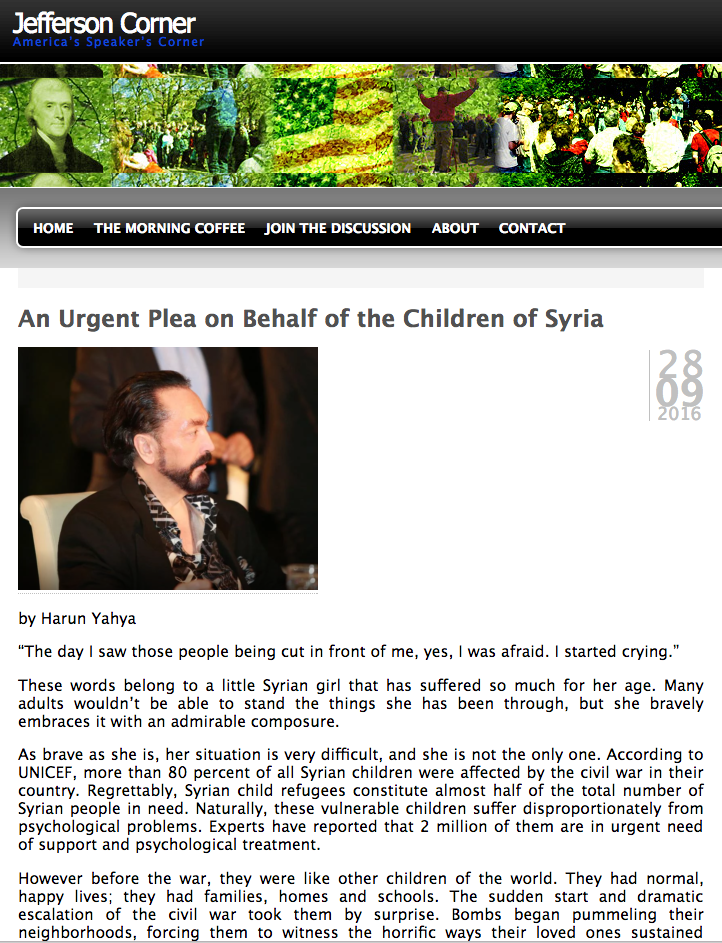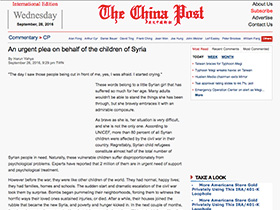
"The day I saw those people being cut in front of me, yes, I was afraid. I started crying."
These words belong to a little Syrian girl that has suffered so much for her age. Many adults wouldn't be able to stand the things she has been through, but she bravely embraces it with an admirable composure.
As brave as she is, her situation is very difficult, and she is not the only one. According to UNICEF, more than 80 percent of all Syrian children were affected by the civil war in their country. Regrettably, Syrian child refugees constitute almost half of the total number of Syrian people in need. Naturally, these vulnerable children suffer disproportionately from psychological problems. Experts have reported that 2 million of them are in urgent need of support and psychological treatment.
However before the war, they were like other children of the world. They had normal, happy lives; they had families, homes and schools. The sudden start and dramatic escalation of the civil war took them by surprise. Bombs began pummeling their neighborhoods, forcing them to witness the horrific ways their loved ones sustained injuries, or died. After a while, their houses joined the rubble that became the new Syria, and poverty and hunger kicked in. In the next couple of months, the struggle was no longer against bombs, violence or clashes alone. Water, electricity and heating were gone and food began running out. People, especially children, started dying of hunger in full view of the world. While obesity continued to kill thousands in different parts of the world, children in Syria tried to feed on grass to stay alive.
Little Ahmad from Kafrenboodeh is one Syrian child that remained in Syria. He explains how he lost his brother and grandfather in front of his eyes, with a greasy auto body shop as his background. He is there because he has to work, despite everything that has happened. He asks the question the world doesn't want to hear: "What's the difference between us and the other children of the world?" Walaa, 5, in Lebanon, says that resting her head on the pillow is the worst thing because that's when the attacks came. Roua'a, from Eastern Ghouta, is a little girl, but, she, with her little friends, has to lift heavy buckets of water, maybe fifty times a day, using a pulley. This is the only way the family can get water for their daily needs.
Most of the Syrian refugees are women and children and among those that left Syria with the hopes of a safer, better life, not more than a couple of hundred, if not less, actually found the peace, respect and dignity that they deserve. However, there is no question that they deserve it like every other human being on this planet. Just like anyone else in their position would they tried to get away from the imminent danger, from an inhumane way of life. They walked through deserts under the scorching sun with nothing but the clothes on their backs, jammed into the backs of trucks with strangers, all with the hopes of attaining safety somewhere else. Although Turkey, Jordan, Iraq and Lebanon admirably shouldered the majority of the burden, millions of Syrian refugees were failed by the rest of the world, which offered almost no help to them.
Masses drowned in high seas of the Mediterranean or the Aegean, tear-gassed and manhandled women, children and the elderly at the hands of the European border officers and facing accusations of being terrorists are only a few examples of the indescribable ordeal these people had to go through.
Imagine, how all these must be affecting the vulnerable soul of an innocent child? Living, seeing and experiencing things adults cannot even bring themselves to see on horror movies, these children were forced to turn into resilient adults at an extraordinarily young age; they had to be strong enough to embrace pain, injury, death, the loss of loved ones, discrimination, abuse, poverty and hunger. As a result, some of them turn angry and aggressive, while others become withdrawn and quiet. The experts believe that the majority of these children are suffering from post-traumatic stress disorder (PTSD).
Although the tragedy in the region is unprecedented, and experts rush to evaluate the situation of the children from a psychological point of view, we all perfectly know that it is possible to make a change and help these children so that they can have better lives. The real action that must be taken in Syria should be restoring the atmosphere of love and brotherhood that children in particular need. It is crucial to show that the best asset is conscience. In order to compensate the deep damage caused by tyranny, the atmosphere in the region should be built on a policy of love, which seems to have been long forgotten. However, to do that, the weapons must be laid down and people should be given hope that days of peace and love will come soon.
Financial support is no doubt crucial for the people in the region. Indeed, it should continue without any interruption, and should be coupled with safety measures for Syria, constructive decisions and hope-inspiring plans. This should be done not only for Syria, but also for the refugees outside Syria. It is also crucial that the leaders of the countries hosting Syrian guests emphasize that the Syrians in their countries are their "own citizens." These people — and especially the children — shouldn't ever be made to feel like they are "the others" or "a burden."
Together we can help these innocent children who have absolutely no fault in anything that happened in their country. Children are the beauties, the ornaments of the world, the innocent souls God created as a blessing for us. Therefore it is our duty to protect them. Let's rise to the task and help these children like they are our own.
Adnan Oktar's piece in The China Post & Jefferson Corner:
http://www.chinapost.com.tw/commentary/china-post/special-/2016/09/26/479454/p2/An-urgent.htm
http://www.jeffersoncorner.com/an-urgent-plea-on-behalf-of-the-children-of-syria/



